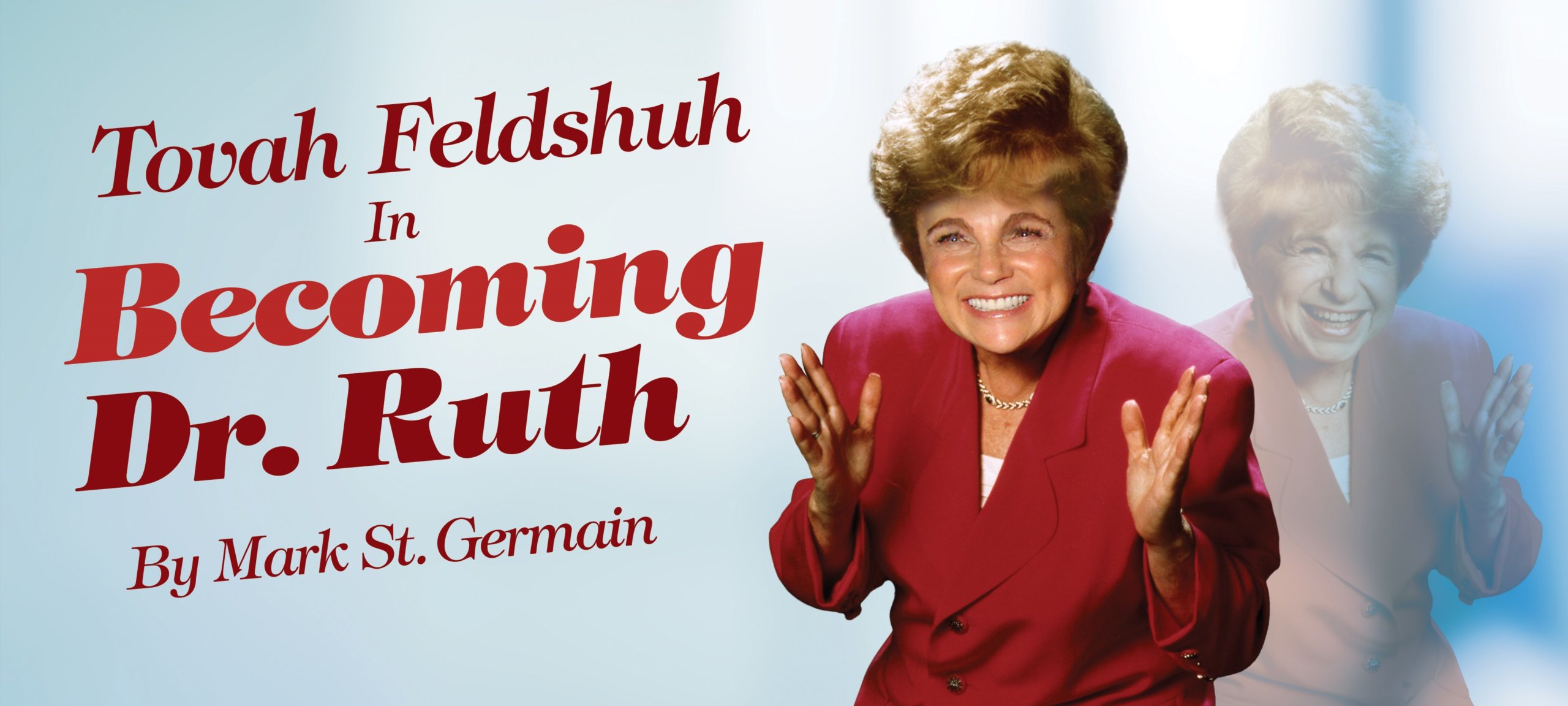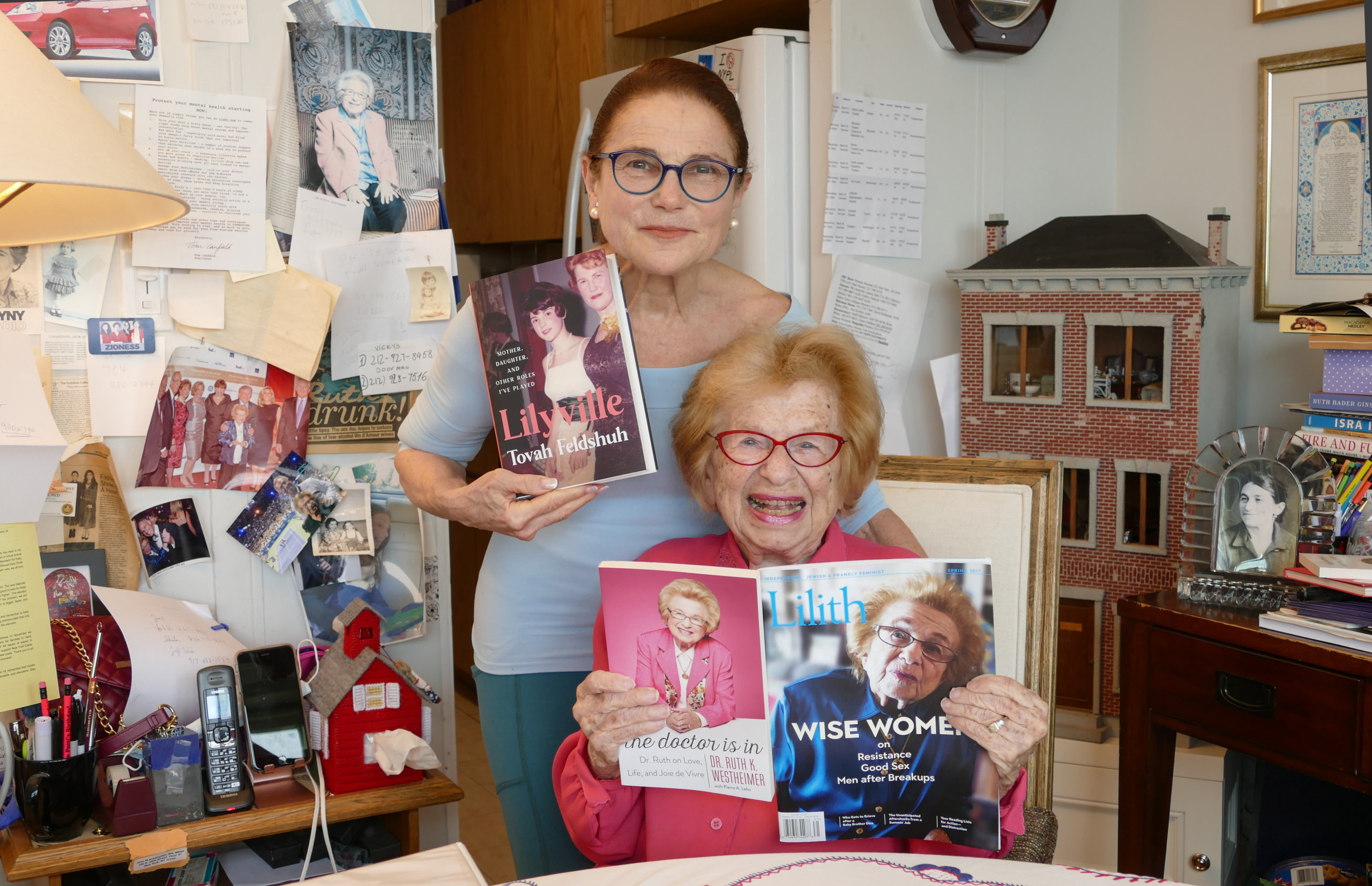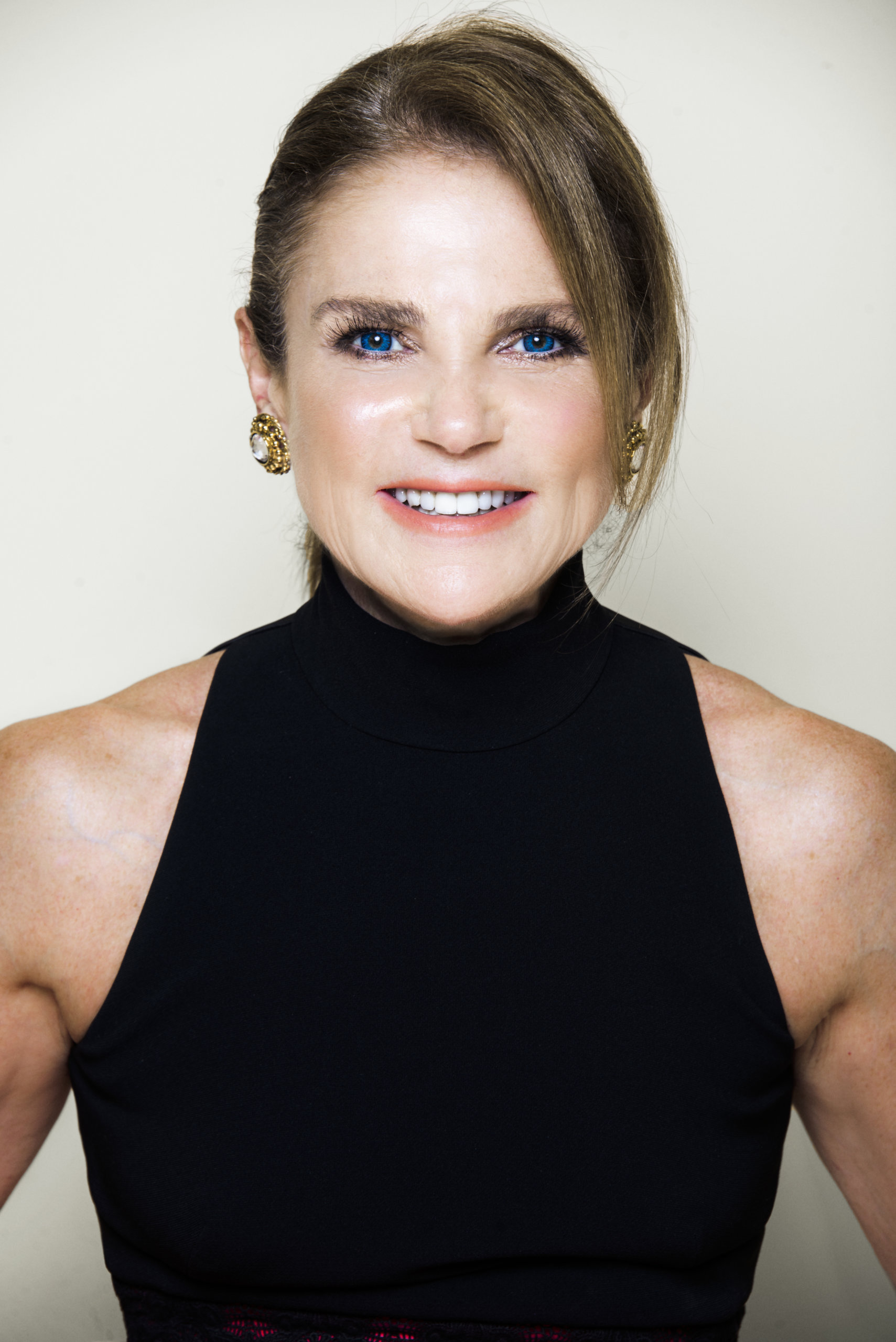Becoming Dr. Ruth: Tovah Feldshuh in St. Germain Play at BST

Legendary sex therapist, psychologist, media personality, radio host, teacher, best-selling author, producer and total inspiration Dr. Ruth Westheimer is headed to Bay Street Theater for the opening of Mark St. Germain’s play Becoming Dr. Ruth, starring the four-time Tony-nominated actress Tovah Feldshuh.
The play opens on June 4, which also happens to be Dr. Ruth’s 93rd birthday.
“I’m careful, you know, being at the age of an endangered species,” she jokes, adding, “I’m fortunate I’m healthy.”
Her energy puts most people to shame.
“She refuses to be depleted,” says Feldshuh. “Playing her is a tremendous honor—she is a teacher to us all on how to deal with making a great life.”
Best known for pioneering explicit talk about sex on radio and television, it’s hard to believe that that part of Westheimer’s career didn’t start until she was 50.
After working with Planned Parenthood and studying human sexuality under Dr. Helen Singer Kaplan at New York Hospital Cornell University Medical Center, she was asked to give a speech to a group of community affairs managers at radio stations about the need for sex education. Her rousing 15-minute speech lead to her first radio gig in 1980.
“WNYW-FM (NBC) said we are going to take a shot—15 minutes at midnight, to see how you do,” says Feldshuh. “They thought probably no one would listen, we’ll tuck you away.”
They listened.
Her career took off and one year later her show Sexually Speaking became a live one-hour show featuring call-in questions from listeners. The radio show lead to her own nationally syndicated television shows, book deals, documentaries, lectures and Dr. Ruth becoming a household name.
She has been an adjunct professor at New York University and an associate fellow of Calhoun College at Yale University. She received a doctorate of education from Columbia University Teacher’s College, where she still gives seminars.

The road to Becoming Dr. Ruth is a fascinating tale of sheer spirit, determination and yes, chutzpah. Her life is a tour de force of survival and a veritable primer on how to thrive under any circumstance.
The most compelling aspect of her story, says playwright St. Germain, is her “resilience and her refusal to look at the negative. She’s been through so much and even when there is a stressful time she is always looking ahead to the time when it isn’t going to be stressful. Not that she hides her head in the sand, but she always looks for the positive.”
Born Karola Ruth Siegel in Frankfurt, Germany in 1928, she was sent to an orphanage in Switzerland by her family on the Kindertransport at the age of 10.
“Her mother and grandmother were there to see her off at the train. It would be the last time she saw them, or any of her family,” says St. Germain. “She wouldn’t have gotten on if her father hadn’t already been taken away (by the Nazis). It was only available to kids who had one parent already in a camp.”
The play chronicles her life from her childhood at the orphanage. “She thought she would be there for six weeks, which turned into six years,” says Feldshuh. It covers her time in Israel, where she won a scholarship to teach Jewish children, then joined the underground Jewish army where she served as a sniper (she was badly wounded after a bomb went off and she almost lost her life). It includes her time in Paris travelling with the doctor who saved her life and where she took classes at the Sorbonne. And it tells the story of her arrival and success in the United States.
“On her first day in America,” says Feldshuh, “she was gazing up at the buildings which she said made her feel smaller (she is 4’ 7”). There were ice cream shops everywhere and she was sure she was going to see Shirley Temple. She saw a large ad for The New School, a scholarship for victims of the Nazis and she applied and won the scholarship. It was her second week in New York and she thought ‘Where else could this happen but in America?’”
Westheimer managed to convince The New School to allow her into the masters program, after presenting her curriculum and studies from the Sorbonne.
“Only she, without a high school diploma could get her masters there (The New School) and at Columbia,” says Feldshuh.
This past spring, Westheimer was awarded an honorary doctorate by an Israeli University (Ben-Gurion University of the Negev, BGU) in recognition of her trailblazing research and therapy and her advancement of the field of human sexuality and public discussion.
“Two thousand people on Zoom,” says Westheimer, proudly, “and we raised $129,000 for a scholarship in psychology which will also go to bettering woman like myself in Switzerland, where I could not get a high school diploma.”
Westheimer says she is grateful to be so busy “in a time where I was home.” She has lived in her apartment in Washington Heights for 60 years and says she has no intention of moving.
She is also “happy to talk about books.” She has authored 44 books, including Sex for Dummies, which is out in 27 languages. Her book Heavenly Sex has now “just become a classic,” she says, “and thanks to New York University Press will never be out of print, as is Musically Speaking about the importance of music in my life,” she says.
She is quick to praise leading lady Feldshuh’s recent book Lilyville about her relationship with her mother.
“Lilyville is beautiful,” says Westheimer. “Tell everybody I plug her book—not just mine,” she adds, with that distinct laugh.

For Feldshuh, the admiration is mutual. The two have known each other for years, and Westheimer attended both of Felshuh’s children’s weddings.
“Having given my life’s blood writing Lilyville and on the heels of finishing that book and having it be well received, I was ready to tackle this play,” says Feldshuh, who visited Westheimer three times in her apartment, reading the play to her over and over, and working on her accent.
The last person Feldshuh played was Ruth Bader Ginsburg. And now the spotlight is on this famous Ruth.
“Dr. Ruth is a huge soul who has spread the availability of intimacy and taken it from the bedroom to the living room to the dining room, “ says Feldshuh. “She has done major healing on the planet and God bless her for that.”
Feldshuh says she is also “thrilled” to be working with Scott Schwartz, who will be directing the play and who directed Feldshuh in Golda’s Balcony also at Bay Street. It will be their fourth time working together.
In terms of Westheimer getting through some very difficult challenges, St. Germain says “she attributes the fact that she survived because she had so much love as a child—that kept her going.”
Westheimer’s own studies conducted for her masters degrees where she followed the 50 other children who came with her from Germany to the orphanage in Switzerland backs up the sentiment.
“What I found is none of them fell by the wayside, none committed suicide, one, became clinically depressed,” she says. “All 50 of us, myself included, came from an intact loving household the first years of our life, which means the early socialization was in an intact, wonderful Jewish—in my case—home. And that’s one of the things I want people to take away from the play. Having this attitude towards life came from my early childhood.”
St. Germain says he wrote the play in two months after completing the research. In terms of portraying his subject, the process for him was to “keep digging.”
“I wanted to get as much of her emotion in things as she shies away from that,” he says. “At one point she said ‘Don’t analyze me!’ We both laugh at it but that was the challenge to kind of get underneath her skin.”
The play, which originally premiered as Dr. Ruth, All the Way at the Barrington Stage Company in 2012, has found a new home at Bay Street Theater where the live, socially-distant audience can see it from June 4-27. The play will also be live streamed for those who can’t see it in the theater via California’s North Coast Repertory Theatre, with David Ellenstein directing and available June 9-July 4. The hope is that it will eventually end up in New York.
St. Germain says he is happy with the play, and “particularly happy that [Dr. Ruth] likes it, and her son Joel and daughter Miriam were very happy with it.”
“I love the play,” says Westheimer, “and I love that Mark St. Germain and I are becoming very good friends. I love that he is not Jewish. It gives it an additional dimension—it is not just a Jewish play—which I think is very important these days, as some people have Holocaust fatigue and say, ‘Don’t talk about it anymore.’ And there is anti-Semitism. I’m very pleased with it. Tovah is going to do a fabulous job.”
What does Dr. Ruth feel most happy about when looking back on her interesting, triumphant life? She wastes no time responding:
“I am most happy that I was instrumental in talking about respect for gay people,” she says. “I was one of the first ones to talk about the issue of AIDS. I really think of myself as an educator mainly. I do educate—not just about sexual literacy but also about the importance of living.”
Becoming Dr. Ruth opens Friday, June 4, at 8 p.m. at Bay Street Theater in Sag Harbor, with performances through June 27 on Thursdays through Saturdays at 8 p.m., Sundays, Tuesdays, and Wednesdays at 7 p.m., and matinee performances on Sundays and Wednesdays at 2 p.m. For info and tickets, visit baystreet.org.



